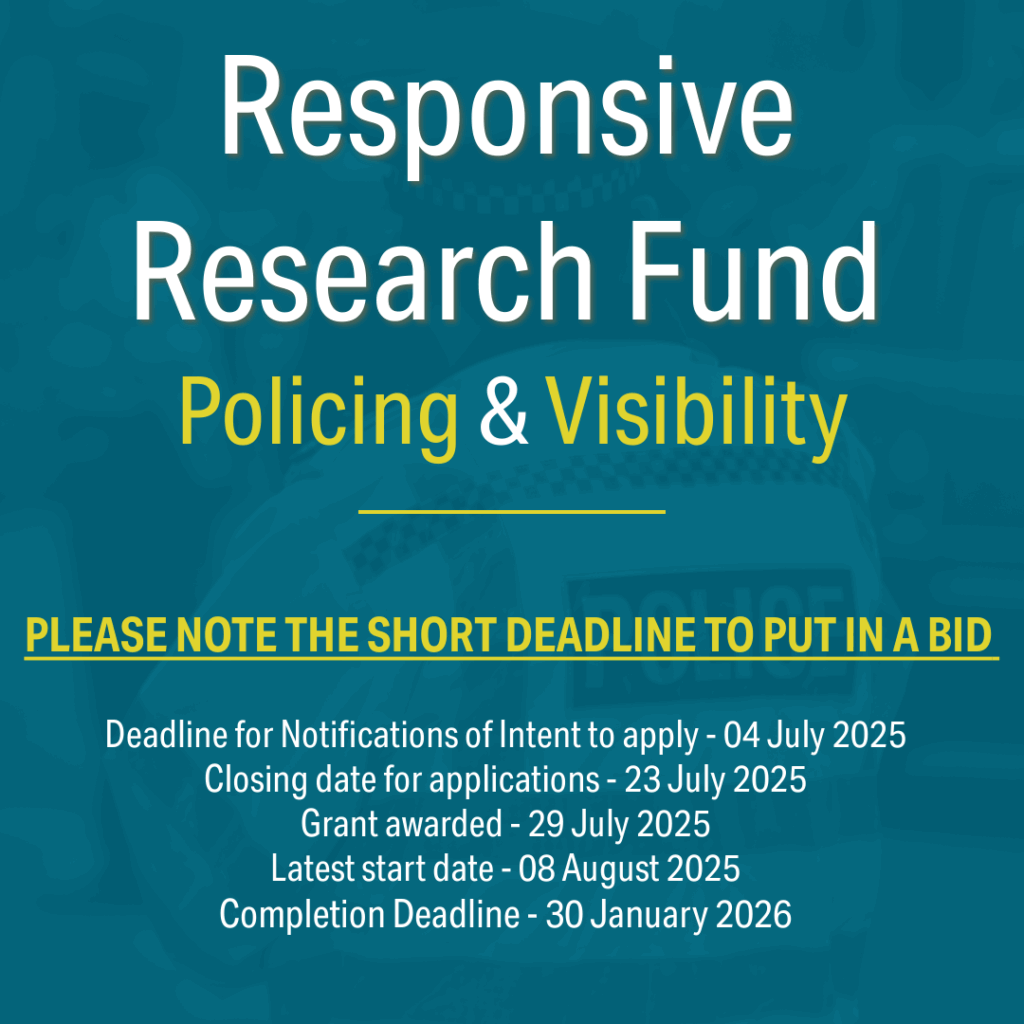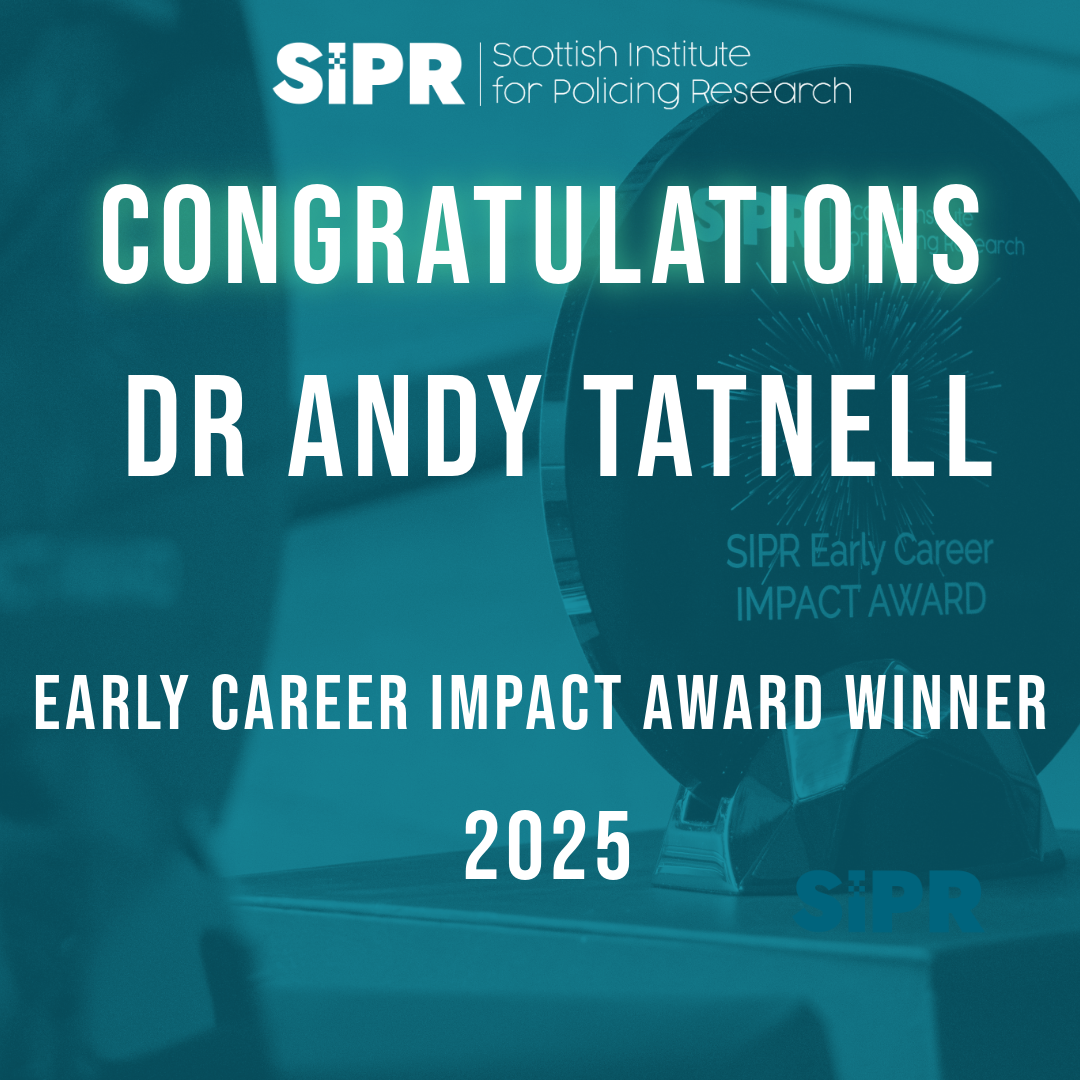
Photo: The winners of the Best Presentation (Claire Taylor) and Best Poster (Richard Jefferies) with Supt. Andrew Todd, Police Scotland.
By Richard Jefferies, University of the West of Scotland.
When I received the information about the SIPR post graduate student symposium I applied immediately. As a business researcher I haven’t had much experience of working alongside researchers from different disciplines, however given that my interests lie in police organisations and the majority of the research conducted into policing falls into different disciplinary areas, I thought it was time to break down the barriers and get out of my little (probably self-created) business focused silo. The fact that my PhD supervisor told me to go probably also contributed to my motivation to attend.
I sent my application in and waited (not too long) to hear if I was accepted, and thankfully I was, so I could start looking forward to the symposium. Then I received the confirmed programme for the day…domestic abuse…mental health distress…human trafficking…child sexual exploitation…sexual offenders…missing adults. These are all very serious, real life and potentially very scary topics. This was way out of my comfort zone of employee satisfaction and pay and benefits structures and corporate culture. I was definitely not in Kansas anymore.
My feeling of trepidation began to build as I read through the abstracts for the platform presentations for the day. The studies all seemed so advanced with very scientific methodologies and I began to worry that perhaps I was out of my depth, or I had picked the wrong community to engage with, and that my research wouldn’t fit in or make as much of a contribution as the others.
So when the morning of the 28th of June arrived I set off with a feeling of anticipation and anxiety as I made my way to my first SIPR event. The journey to Dundee is a blur of “Born to be wild”, “Sharp dressed man” and “Highway to Hell” from Apple music’s “Classic Rock Road Trip” playlist as I tried not to dwell too much on whether I was going to be found out and branded a fraud as a researcher. I do remember lots of road works and traffic diversion signs which didn’t help with the building anxiety as it became apparent that I was going to be late, I’d probably just miss registration. I finally made it to the Dalhousie Building, deciphered the room number coding system and made my way to room 2F13.
I was late, and I did miss registration, but I also missed the introduction and I was now that really rude person that everyone hates who interrupts a presentation. Thankfully Elaine wasn’t put off in the slightest by my barging in and continued to deliver a professional and very interesting presentation on Ethic Minority Women & Domestic Abuse in Scotland; it was apparent why she won the PG student award at last year’s symposium.
As the presentations continued the level of impact of the research being conducted by the attendees became very clear, as well as the quality. The panic really set in. At one point I considered making a run for it and telling my supervisor that I was sick, or that I got lost on the way to Dundee and then my rational self prevailed, I took a deep breath and started to pray that no one would ask me any difficult questions…and no one did.
There was a break for lunch and a chance to meet some of the attendees. Everyone seemed to know each other but they didn’t seem to be put out by the presence of an outsider and I had some very interesting conversations. I was pleasantly surprised and encouraged by the genuine interest that was shown to my research and I received numerous offers of help.
The afternoon presentations, particularly those on volunteering and police use of social media were on subjects that I was slightly more familiar with. Again the quality of the research being conducted was evident and the impact that all of these projects will have on policing in the future is clear. There really is the potential to make a real difference.
Following a short coffee break the judges delivered their verdict and the best presentation prize went to Claire Taylor for her presentation on Behavioural Consistencies in Repeat Missing Adults. When presenting the prize Superintendent Andrew Todd said that he had been impressed with Claire’s work and could see the impact that the work would have in helping to solve a very real issue.
All in all I had a really enjoyable day at the Symposium. It opened my eyes to breadth of policing research that is being conducted in Scotland and introduced me to what seems to be a very supportive and welcoming research community. My biggest shock of the day…I won the prize for best poster. I’m still convinced that this was only because my poster was twice the size of the others (I didn’t read the guidance carefully enough); nevertheless the encouraging comments from the judges definitely sent me off on a little high with a renewed enthusiasm for my PhD and I look forward to many future SIPR events and all the opportunities that this brings.
Comments are closed, but trackbacks and pingbacks are open
This work is licensed under a Creative Commons Attribution-NonCommercial-NoDerivatives 4.0 International License



